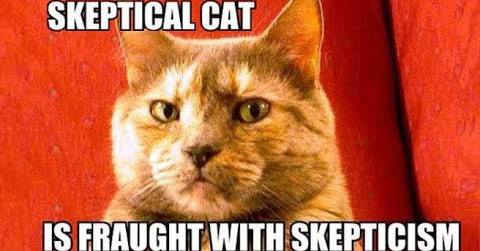This session will be moderated by Greg, who has a PhD in philosophy, specializing in epistemology, theories of knowledge.
It is very difficult, if not impossible, for human beings to base their beliefs on evidence. If we value evidence-based-belief very highly, this can be a difficult idea to live with. If we do not value evidence-based-belief very highly, we will be vulnerable to charlatans, demagogues, and propagandists. How do we cope?
This session will be divided into multiple sections in which the moderator will give a brief presentation before inviting open discussion. No advanced reading is required, but some passages from primary philosophical texts will be introduced as topics of discussion. Recommended reading is listed only for those who want to dive deeper on their own.
Section #1: Overview of Skepticism
Types of skepticism (Academic, Pyrrhonian, Scientific) and other necessary terminology that will give us a foundation for further discussion. Some general arguments for skepticism.
Recommended reading:
https://plato.stanford.edu/entries/skepticism/
https://en.wikipedia.org/wiki/Skeptical_movement
Section #2: Socrates
Socrates believes that no human being has knowledge of virtue, and can therefore be thought to be a moral skeptic. He nevertheless acts in ways that suggest that he has very strongly held moral beliefs. Is Socrates a skeptic? What can we learn from his philosophical practice?
Recommended reading: Plato, particularly the Meno, but also Apology, Crito, Euthyphro, and Hippias Minor.
Section #3: Montaigne
Michel de Montaigne advocates for Pyrrhonian skepticism on the grounds that it creates room for faith. Is this a contradiction? Is it a model for how to cope with skepticism?
Recommended reading: Michel de Montaigne, Apology for Raymond Sebond
Section #4: Hume
Hume famously argues that scientific beliefs are ultimately unjustified, because they rely on assumptions that cannot be justified either empirically or a priori. In the same text, Hume recommends a form of mitigated skepticism on the grounds that it destroys harmful superstition and metaphysics, in favor of more modest scientific inquiry. Is this a contradiction? Is it a model for how to cope with skepticism?
Recommended reading: David Hume, An Enquiry Concerning Human Understanding
If you haven't already, consider joining SOPHIA!



Please note: The administrators of this site reserve the right to delete comments that are offensive or off-topic.